Pandemic in China: Will Beijing repeat Shanghai's mistakes?
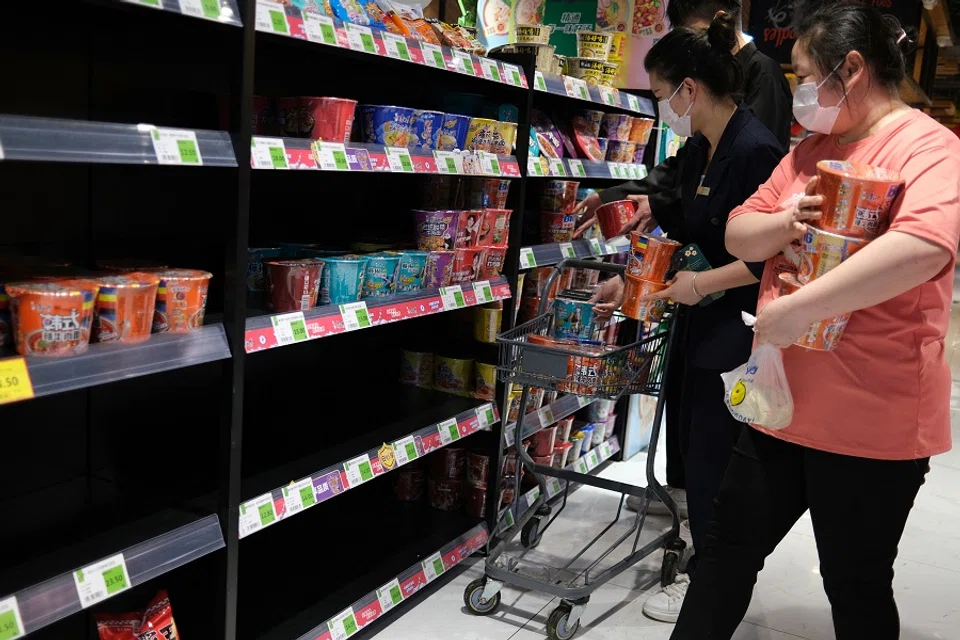
Last weekend, Beijing reported a sudden Covid-19 spike. Chaoyang District, where I live, became the "topmost focus for pandemic prevention", and local authorities started mass testing on 25 April.
Preparing for lockdown
Upon hearing the news, my friends from Shanghai advised me to immediately stock up on food and daily necessities just in case. One of them even sent me a stockpiling strategy: buy more beans because they have a long shelf life - soybeans can be made into soymilk, while mung beans can be sprouted; leave ample space in the refrigerator for beef and seafood because these are harder to get through group purchase; if the refrigerator is not big enough, quickly buy a small one online just in case.
Another friend shared their experience: do not stockpile cabbage, potatoes and radish because these are the vegetables that the residential committee will distribute to its residents; buy fruits that last longer and definitely stock up on eggs, which are one of the most useful ingredients. If there is not enough time to cook, stock up on frozen food, instant noodles and Zihaiguo (自嗨锅) self-heating instant hotpots.
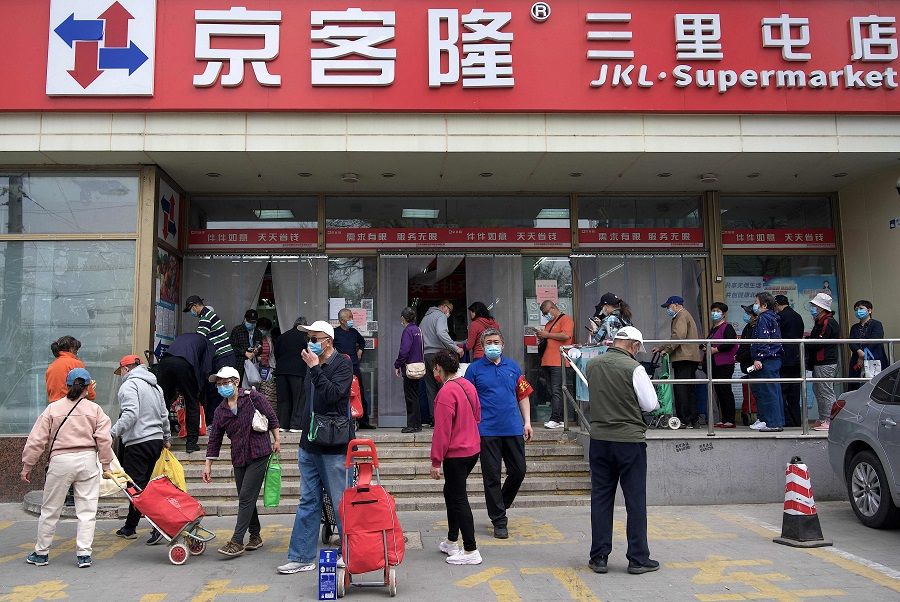
Another person even warned me not to assume that my stockpile of food and supplies would be enough before the lockdown - bartering would eventually be necessary. Based on people's experience in Shanghai, Coca-Cola, eggs, onion, ginger and garlic are the most valuable items as these can be traded for almost anything.
A Singaporean friend also advised me to actively widen my social circle and join various residential management chat groups for my residential community, as well as to have grocery suppliers on my contact list. This would give me multiple lobangs (Singaporean slang referring to a good deal or opportunity) during the lockdown. After all, nobody knows how long the lockdown will last, and stockpiles will eventually run out. When that happens, these contacts will be a godsend.
"Shanghai residents wait for food and supplies amid a lockdown while Beijing residents wait for a lockdown under stockpiles of food and supplies." - Chinese netizen
A repeat of 2020?
I became anxious after reading the news of panic buying in Beijing and receiving advice from friends who have experienced a lockdown. While I think that it is unlikely that Beijing would go under lockdown, the situation in Shanghai has taught me to be better safe than sorry. I decided to heed the advice of my friends and take action.
Since Covid-19 became a pandemic, people have easily gone into panic-buying mode at the first signs of trouble. Such scenes have played out countless times across China. Beijing officials have repeatedly reassured residents that there would be sufficient supplies of resources and daily necessities. Local state media have also reminded people to make rational purchases. Yet, panic buying has persisted in the Chinese capital over the past few days.
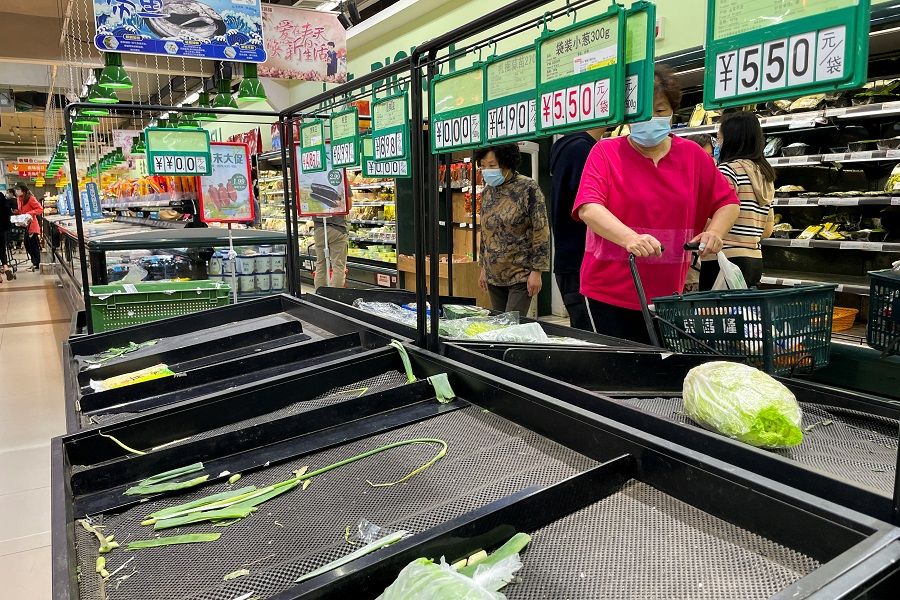
On the morning of 25 April, long queues formed outside various supermarkets in Chaoyang District and supplies were swept off the shelves, with people leaving the stores carrying bags of groceries. On online grocery platforms, either the items are "out of stock" or delivery services are facing "inadequate capacity".
A netizen teased, "Shanghai residents wait for food and supplies amid a lockdown while Beijing residents wait for a lockdown under stockpiles of food and supplies." Another said, "It has come to a point where it would seem strange now not to impose a lockdown."
Over the past two years, Beijing experienced multiple local outbreaks, including the Xinfadi Market outbreak in June 2020. 92 people have been infected since 22 April when the current outbreak occurred. While this is a small number when compared with Beijing's population size of about 20 million residents, the outbreak still triggered an unprecedented level of anxiety.
Behind this anxiety is the worry that Beijing will eventually meet the same fate as Shanghai. Beijing residents are not only hoarding food and supplies but also trying to muster a sense of security, which is thinning after seeing Shanghai's struggles.
... both are model cities, and it is difficult for those in Beijing not to empathise with Shanghai's plight.
A tale of two cities
There are many differences between Shanghai and Beijing - one is known as the "mystical city" (魔都, a nickname for Shanghai from a 1924 novel by Shofu Muramatsu), while the other is the imperial city; one is China's economic hub, while the other is the political centre; one is the window to the world, while the other is the imperial city where the Sons of Heaven trod. Nonetheless, both are model cities, and it is difficult for those in Beijing not to empathise with Shanghai's plight.
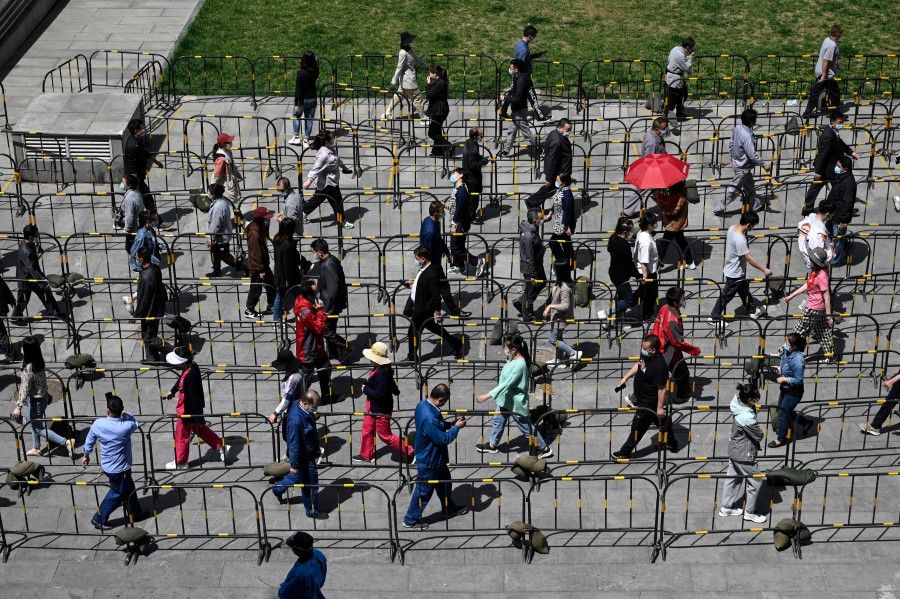
After the pandemic situation in Shanghai spiralled out of control, the authorities repeatedly announced that there would be no lockdown, and even clamped down on the spread of online rumours. But the city still went into "static management", which is basically a form of lockdown.
Over the past month, shortages in groceries, food and medical services have put Shanghai in the spotlight, and led to a swell of voices questioning the city's anti-epidemic policies.
Besides the enormous impact of the lockdown on economic operations and daily life, the panic, loss of control and even tragedies in Shanghai have caused anxiety to spread to other cities, making more people feel uneasy, impacting the people's trust in the government and denting public confidence in anti-epidemic measures.
If China's two most important cities fall one after the other, would that officially mean that the country's pandemic efforts have failed?
If Shanghai cannot control the Omicron variant, will Beijing also follow in its footsteps? Will the chaos that hit Shanghai after the implementation of the lockdown also play out in Beijing? If Beijing goes into a strict lockdown, does the government have the ability to mobilise its people and manage the situation, and ensure sufficient basic supplies and medical services?
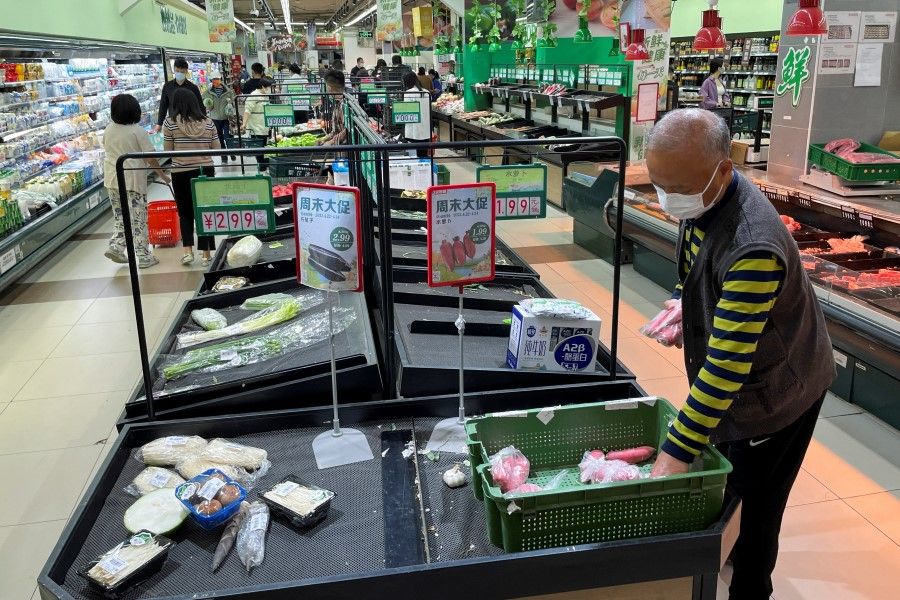
If China's two most important cities fall one after the other, would that officially mean that the country's pandemic efforts have failed? How much personal sacrifice would there be, and at what price to the country?
While a lockdown in Beijing seems unlikely, these questions have probably cropped up in the minds of each person who is busy stocking up right now.
Whether Beijing can avoid a breach and a repeat of the same mistakes made in Shanghai will determine whether the people's confidence lost during the Shanghai outbreak can be restored.
Indeed, there are practical considerations behind China's persistence with its "dynamic zero" approach. China is vast and complicated, and its large population and unbalanced medical standards across the country have made it difficult for the entire nation to break out of its habit and adjust its control measures, which have previously proven effective.
There are also political factors involved in the government's decision to keep to this path. But whichever path it chooses, in order to move forward, there must be unity of thought and pace, as well as a high level of public trust in the government and its system.
Faced with the aggressive Omicron variant, Beijing is trying to implement aggressive testing and contact tracing. This current wave has become a political and economic issue. Whether Beijing can avoid a breach and a repeat of the same mistakes made in Shanghai will determine whether the people's confidence lost during the Shanghai outbreak can be restored. And this will have a deep impact on China's subsequent approach to the pandemic.
Related: Shanghai's worsening Covid-19 outbreak is turning political | Shanghai's Covid shutdown is disrupting domestic and global supply chains | Why rumours spread faster than outbreaks in Shanghai | Can Shanghai meet its zero-Covid deadline and resume production? | Singaporeans in Shanghai: How to cope when a city shuts down during the pandemic | As the virus spreads, can China calm its people and contain the outbreaks? | [Comic] When Shanghai residents fight over vegetables
